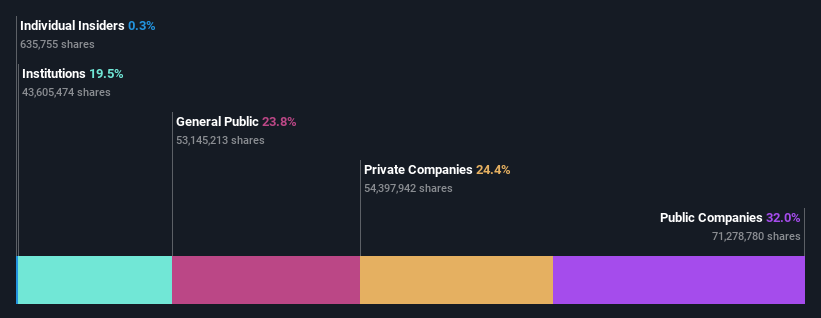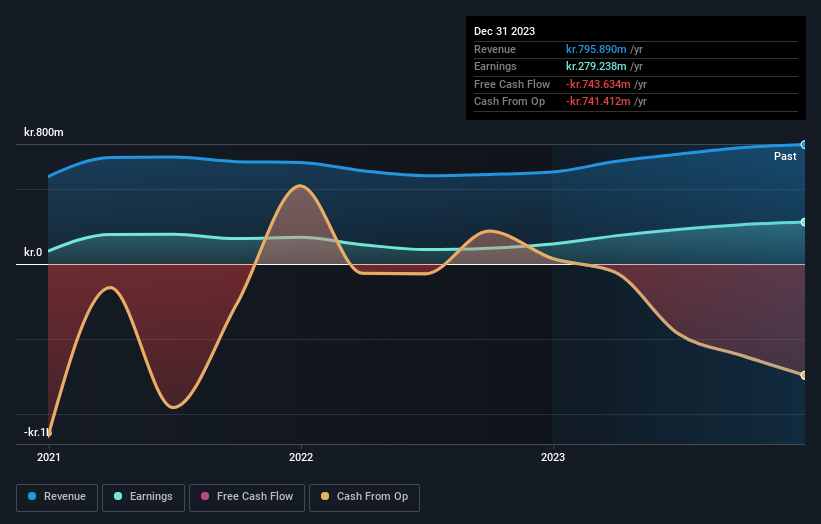Stock Analysis
Danske Andelskassers Bank A/S' (CPH:DAB) largest shareholders are public companies who were rewarded as market cap surged kr.301m last week

Key Insights
- Significant control over Danske Andelskassers Bank by public companies implies that the general public has more power to influence management and governance-related decisions
- The top 3 shareholders own 56% of the company
- 20% of Danske Andelskassers Bank is held by Institutions
If you want to know who really controls Danske Andelskassers Bank A/S (CPH:DAB), then you'll have to look at the makeup of its share registry. And the group that holds the biggest piece of the pie are public companies with 32% ownership. That is, the group stands to benefit the most if the stock rises (or lose the most if there is a downturn).
As a result, public companies collectively scored the highest last week as the company hit kr.2.9b market cap following a 12% gain in the stock.
Let's take a closer look to see what the different types of shareholders can tell us about Danske Andelskassers Bank.
View our latest analysis for Danske Andelskassers Bank

What Does The Institutional Ownership Tell Us About Danske Andelskassers Bank?
Many institutions measure their performance against an index that approximates the local market. So they usually pay more attention to companies that are included in major indices.
We can see that Danske Andelskassers Bank does have institutional investors; and they hold a good portion of the company's stock. This implies the analysts working for those institutions have looked at the stock and they like it. But just like anyone else, they could be wrong. If multiple institutions change their view on a stock at the same time, you could see the share price drop fast. It's therefore worth looking at Danske Andelskassers Bank's earnings history below. Of course, the future is what really matters.

We note that hedge funds don't have a meaningful investment in Danske Andelskassers Bank. Our data shows that Spar Nord Bank A/S is the largest shareholder with 32% of shares outstanding. The second and third largest shareholders are Fonden For Andelskasserne I Område Syd and Fonden For Andelskasserne I Område Nord, with an equal amount of shares to their name at 12%.
To make our study more interesting, we found that the top 3 shareholders have a majority ownership in the company, meaning that they are powerful enough to influence the decisions of the company.
While studying institutional ownership for a company can add value to your research, it is also a good practice to research analyst recommendations to get a deeper understand of a stock's expected performance. As far as we can tell there isn't analyst coverage of the company, so it is probably flying under the radar.
Insider Ownership Of Danske Andelskassers Bank
The definition of company insiders can be subjective and does vary between jurisdictions. Our data reflects individual insiders, capturing board members at the very least. Management ultimately answers to the board. However, it is not uncommon for managers to be executive board members, especially if they are a founder or the CEO.
Insider ownership is positive when it signals leadership are thinking like the true owners of the company. However, high insider ownership can also give immense power to a small group within the company. This can be negative in some circumstances.
Our data suggests that insiders own under 1% of Danske Andelskassers Bank A/S in their own names. But they may have an indirect interest through a corporate structure that we haven't picked up on. It appears that the board holds about kr.8.2m worth of stock. This compares to a market capitalization of kr.2.9b. We generally like to see a board more invested. However it might be worth checking if those insiders have been buying.
General Public Ownership
The general public-- including retail investors -- own 24% stake in the company, and hence can't easily be ignored. While this group can't necessarily call the shots, it can certainly have a real influence on how the company is run.
Private Company Ownership
We can see that Private Companies own 24%, of the shares on issue. Private companies may be related parties. Sometimes insiders have an interest in a public company through a holding in a private company, rather than in their own capacity as an individual. While it's hard to draw any broad stroke conclusions, it is worth noting as an area for further research.
Public Company Ownership
Public companies currently own 32% of Danske Andelskassers Bank stock. We can't be certain but it is quite possible this is a strategic stake. The businesses may be similar, or work together.
Next Steps:
It's always worth thinking about the different groups who own shares in a company. But to understand Danske Andelskassers Bank better, we need to consider many other factors. To that end, you should be aware of the 1 warning sign we've spotted with Danske Andelskassers Bank .
Of course this may not be the best stock to buy. So take a peek at this free free list of interesting companies.
NB: Figures in this article are calculated using data from the last twelve months, which refer to the 12-month period ending on the last date of the month the financial statement is dated. This may not be consistent with full year annual report figures.
Valuation is complex, but we're helping make it simple.
Find out whether Danske Andelskassers Bank is potentially over or undervalued by checking out our comprehensive analysis, which includes fair value estimates, risks and warnings, dividends, insider transactions and financial health.
View the Free AnalysisHave feedback on this article? Concerned about the content? Get in touch with us directly. Alternatively, email editorial-team (at) simplywallst.com.
This article by Simply Wall St is general in nature. We provide commentary based on historical data and analyst forecasts only using an unbiased methodology and our articles are not intended to be financial advice. It does not constitute a recommendation to buy or sell any stock, and does not take account of your objectives, or your financial situation. We aim to bring you long-term focused analysis driven by fundamental data. Note that our analysis may not factor in the latest price-sensitive company announcements or qualitative material. Simply Wall St has no position in any stocks mentioned.
About CPSE:DAB
Danske Andelskassers Bank
Danske Andelskassers Bank A/S provides various banking products and services to private, small and medium-sized business, and institutional customers in Denmark.
Solid track record with adequate balance sheet.

